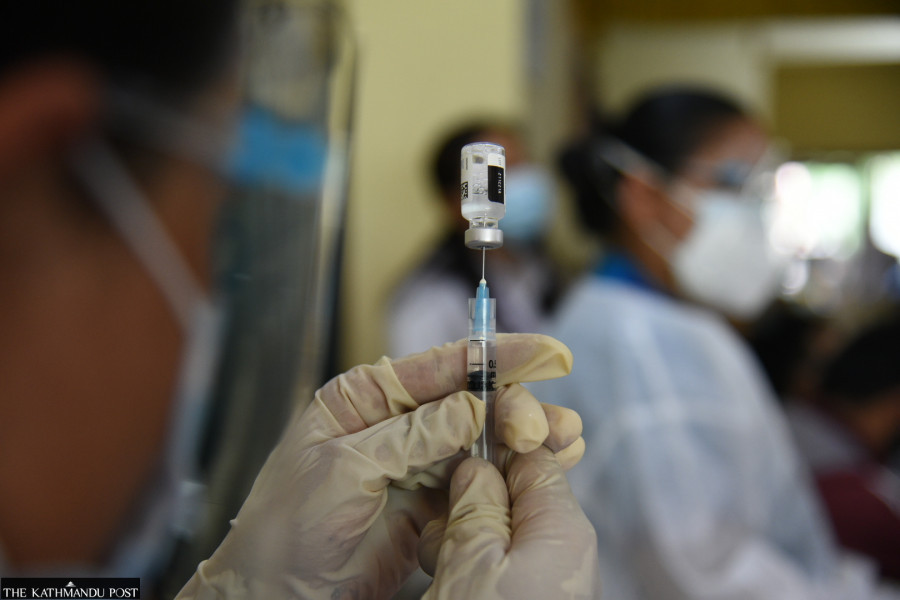Health
Half a million Covid vaccines for kids go to waste
Around 500,000 doses of Pfizer’s Covid-19 vaccine in stock are set to expire this month while thousands of children above 5 years are yet to be jabbed.
Arjun Poudel
Around 500,000 doses of Pfizer’s Covid-19 vaccine in stock are set to expire this month. What is more concerning is that the Covid vaccination programme, which was halted months ago, is yet to start despite growing risk of a new surge in coronavirus cases.
“We have around 486,000 doses of Pfizer for kids in stock, which will expire at the end of January,” said Dr Bibek Kumar Lal, director at the Family Welfare Division under the Department of Health Services. “We have requested local governments to start vaccination before that.”
Data provided by the Health Ministry shows that over 250,000 children above five who were administered the first dose of the vaccine have not taken their second dose, which is necessary to boost the protection level against Covid, according to experts.
“Ninety percent of the children aged between five and 11 years had taken the first dose of the vaccine,” said Sagar Dahal, chief of the immunisation section at the division. “Of them only 80-82 percent have been administered the second dose.”
Experts say a significant decline in the Covid infection rate, closure of schools at the time of vaccination and the apathy of the authorities concerned to continue with the vaccination drive in schools are the main reasons for the low vaccine uptake.
With a new Covid variant B.F.7 spreading in many countries, they say that it is better to fully vaccinate young children at the earliest. And every day, hundreds of children reach five years of age, meaning that they are eligible to get the vaccine doses.
“Yes, thousands of eligible children have not taken the vaccine,” said Lal. “There still are tens of thousands of unvaccinated children and there are enough vaccine doses in stock, but we haven’t been able to administer the vaccine.”
According to Health Ministry officials, the responsibility to administer Covid-19 vaccine lies entirely with the local governments.
The ministry had administered Covid vaccine to children between five and 11 in two phases—first in 27 districts from June last year and in 50 districts from August. Children were given the vaccine in schools.
Health Ministry officials have asked the general public to get their eligible children inoculated with the coronavirus vaccine and inquire about the availability of doses in nearby health facilities.
Nepal had received 8.4 million paediatric doses of the Pfizer-BioNTech Covid-19 vaccine from the Covax facility, the United Nations-backed international vaccine-sharing scheme.
Public health experts have warned of the risk of a new wave in coronavirus cases in the country in the coming days, as China and other Asian countries such as Japan and South Korea, where Nepalis have high mobility, have been witnessing a rapid surge in infections.
China recently opened its borders with Nepal after two and a half years, just when the spread of the coronavirus there started getting out of control.
India too has recorded a marginal rise in the number of new cases in recent days. The southern neighbour may see a surge in the next five weeks, according to media reports.
Experts in Nepal said that the rise in new cases in India is a matter of concern given the uninterrupted cross-border movement of people between the two countries.
Nepal and India share over 1,800km of porous and unregulated border from where thousands of people move across the two countries every day.
Infectious disease experts say that a new surge in Nepal is inevitable; it is only a matter of time. They say preventive measures could reduce the impact of a new surge in infections.
The country has yet to report the presence of the B.F.7 variant that is spreading in China and other countries but, again, experts say its entry into Nepal is inevitable.
Nepal has reported almost all variants and sub-variants of Covid detected in the world. Due to the high mobility of Nepali people across the globe, the risk of any virus variant entering the country remains high, doctors say.
Meanwhile, the Health Ministry said that Covax, the United Nations-backed international vaccine-sharing scheme, has informed that 1.5 million doses of bivalent Covid vaccine may arrive on February 3. The bivalent Covid vaccine includes a component of the original virus strain to provide broad protection against Covid and a part of the Omicron variant.
It is part of the 9.2 million doses promised to Nepal by the facility. Of the 9.2 million doses of adult Pfizer-BioNTech vaccine it committed, only around three million have been supplied so far.
Public health experts have been highlighting the importance of inoculating the Nepali population with booster and second booster shots at the earliest in light of a new surge in coronavirus cases.
So far, 12,019 Covid-related deaths have been reported in Nepal, according to the official count. The Health Ministry said 22,324,933 people, or 76.5 percent of the total population, have been fully vaccinated. The number of people taking booster shots stands at 7,972,791.




 11.84°C Kathmandu
11.84°C Kathmandu















